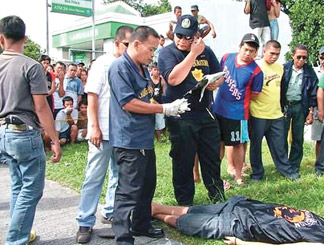|
Some final tips on investigative reporting :
Tread carefully when writing an expose
Gaston de Rosayro

Using a graph in a story |
Investigative reporters must tread warily as we discussed in the two
previous columns. You will have to take special care virtually walking
on eggshells. This is because investigative stories usually make someone
appear either bad or stupid, accusations which can lead to legal action
against you for defamation.
You will probably be safe if your story is true and in the public
interest. But it can lose the protection of the law if there are serious
errors. It would be safer still if you have irrefutable proof, which
most editors and legal advisers would insist on before publication.
Someone - probably the people your story exposes as corrupt,
dishonest or simply incompetent - will be looking closely for mistakes
to attack you. So do not fool around and weigh every word you write. (We
will deal with the subject of defamation at a later date.)
Writing stories based on investigative journalism require all the
skills you need for general journalism. However, given the risks you
will face in investigative journalism, a few of the core rules are worth
stressing again.

Writing short sentences |

An alleged crime scene |
You will be much safer if you stick to facts which you can prove are
true. That is why you check your facts and get confirmation for each
one. As you write, stop at each new important fact and ask yourself: "Is
this true?" Then ask yourself again: Have I confirmed it with another
reliable source?"
Do not speculate by writing things which might be true, but which you
cannot prove. If you do not have all the facts you would like, you may
have to be satisfied with a lesser story, as long as it makes sense and
contains no errors.
Do not include your personal opinions. You may be writing a story
about someone who has cheated people out of their life savings. You may
detest the man but you cannot say detestable things about him. You know
for sure he is a charlatan. But you should not publicly proclaim it
either. If you imply in your story that you hate this man, that could be
construed as malice, which will certainly destroy your defence against
defamation.
Just give your readers and listeners the facts. If the man is
villain, the facts will lead your audience to that conclusion without
you telling them what to think.
Keep your sentences short and your language simple and concise. Some
investigations will reveal some very complicated facts, perhaps because
the persons under suspicion have tried very cleverly to hide their
transgression. You must simplify your facts for your readers or
listeners, so they get a clear picture of what has happened.
Wherever possible, avoid using vague words, such as “a large amount”
or “some time later”. Such words will reveal that you do not have
accurate details – or else you would have used them. Sometimes this is
unavoidable, but vague words will usually take the strength out of a
story.
You should check your work at each stage and when you have finished,
double check everything again.
Ask yourself again: "Are these facts correct and confirmed?" If you
have sufficient time, put the story aside for a few hours. Then return
to it with a fresh mindset, seeing it as a reader or listener might.
Ask a colleague to read the story and try to find any discrepancies.
Do not be upset if they point out errors or big gaps in information. It
is better to be told now by a colleague than later be harangued by an
opposing lawyer in a defamation case.
Wherever possible, show the story to your organisation's legal
adviser.
One final check worth making is to ask yourself is whether your
sources are protected. Make certain you have not identified your
confidential sources even unwittingly. Also read the story as if you are
the individual who has been accused of incompetence or corruption. See
if they could connect or be able to identify any of your confidential
sources from what you have written. If there is any risk at all, change
the story to protect your sources.
You can use any illustrations to make your story more interesting?
Perhaps you can use pictures of the victims looking sad, or someone at
the scene of an alleged crime.
In a story about how a government department has been wasting
taxpayers' money, you might use a graph to show how the money has
disappeared over the years.

Using a relevant section of a document to support the story |
For instance, if you have a really important document to support your
story, include the relevant sections of that document as an
illustration.
On television, you can type quotations from the document to run
across the screen as the story is being read out.
However carefully you write your story to make it safe, a sub-editor
may not understand exactly why you use certain words or describe
something in a certain way.
The sub-editor may write a headline which is wrong or possible
defamatory.
Having spent a lot of time working on the story, do not abandon it at
this final stage. Discuss possible headlines with the sub-editor, until
both of you are satisfied you have done the best job possible.
As we have said several times in this series there are many dangers
to investigative reporting. The greatest danger is that you will do or
write something which will allow the person under suspicion to take you
to court for defamation or on some other charge. So remember the
following:
It may happen that a story you are investigating is also being dealt
with by a court. In most countries, a matter before a court is said to
be sub judice and there are limits on what can be reported about it,
beyond what is said in the court.
Be very careful when covering any sub judice matters. Consult your
editor or lawyer for advice. If you make the wrong decision, you could
be charged with contempt of court.
If someone complains about a mistake after the story is published or
broadcast, never issue an immediate apology or correction without
talking first to your editor and lawyer. They will decide what action to
take.
Sometimes people will ask to be paid for their information. Try to
avoid this, but sometimes it is necessary, even if it is a few bucks for
a tip-off. However, never pay sources for information which might have
involved criminal activity.
For example, if someone asks for Rs.10,000 to provide a document and
then steal it, you too could be charged as an accomplice to theft.
Any such payment could be viewed as encouraging a crime.
Become familiar with all the different places you can get information
from, such as company registers and court records. As well as
accumulating information, you must also gather supporting evidence in
case your story is challenged.
You may live in a country where the media are controlled and the
government will not allow any real investigative reporting. You and your
editor must decide whether or not you should take the risk of carrying
out investigative reporting which the government will not like, and may
punish you for. But journalists throughout the world have often had to
make such decisions. Some have paid the price with imprisonment or
death. You must decide in each case whether the issue is worth the risk.
[email protected]
|



